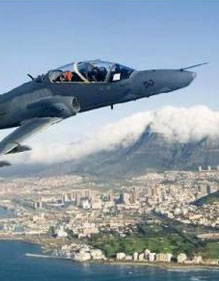
THE Arms Procurement Commission is a “waste of taxpayers’ money”.
Speaking on Friday 29 August, a day after he and fellow critics Paul Holden and Hennie van Vuuren announced they were withdrawing from the inquiry, Andrew Feinstein said while they had “really wanted this commission to work”, they had concluded they could no longer participate as it was not “conducting itself in such a way that it is going to be able to fulfill its mandate”.
Also known as the Seriti Commission, the commission is probing allegations of wide scale fraud and corruption in South Africa’s controversial 1999 arms deal.
Its operation has so far cost R63-million, according to the Justice Department in July, with a further R59-million set aside for the 2014/15 financial year. The commission’s term was supposed to end in November but chairman Judge Willie Seriti is believed to have applied for an extension until February.
Not allowed to use others’ documents
Feinstein, a former ANC member who was the co-chairman of Parliament’s standing committee on public accounts at the time of the deal, said the main obstacle was that they would not be allowed to depend on documents that they had not written in their testimony.
He pointed out that they had used the documents to write well-received books on the arms deal and that not one of the three had been sued by either individuals implicated in their tomes or by the defence companies.
“Part of the reason for this is that we do not write these books off the top of our head. We research it. We have to be unbelievably careful. Everything we write about is based on documentary evidence,” he said.
Feinstein said they had decided to pull out after Seriti’s rulings had made it clear that they would not be able to rely on evidence they had collected but which they had not written.
“We couldn’t give evidence because we realised we would not be able to use these documents to make our claims, including documents where a company that won contracts admitted that (Department of Defence chief of acquisitions) Chippy Shaik had asked them for a $3-million bribe. We are not the authors and the commission won’t admit them as a consequence,” he said.
Personal knowledge a prerequisite
“Seriti has ruled that witnesses can’t talk about anything unless they have personal knowledge,” said Feinstein.
“The people who have personal knowledge are the people who’ve been corrupted, the people who have paid bribes and their intermediaries. It’s clear that none of these people are going to appear and announce delightedly what they’ve done. According to this logic, we will never be able to investigate and reveal corruption around the world.”
He pointed out that when the commission was established in 2011, he and Holden had made an unsolicited submission of almost 2 000 words and included a disc of documents they had collected over many years. He had also supplied the commission with the contact details of prosecutors around the world who had been involved in investigations into the arms deal.
He said the commission had undertaken at the time to “make available to us any documents that had any bearing on our own evidence”.
But they had subsequently experienced great difficulties in getting access to documents they had requested.
Feinstein said it had also subsequently become clear that either the commission had never contacted the prosecutors he had put them in contact with, or – where they had promised to work with Seriti – the commission had not followed up.
And the commission had not read millions of pages of documents that it had received from four different agencies that had investigated the deal despite having it in its possession. “These documents are extremely important. (But) the commission hasn’t even read it,” he said.
Small likelihood of key evidence emerging
Lawyers for Human Rights – which represented the trio at the commission – concurred hat it had been very difficult. David Cote said the commission had been “very hostile” to their requests for postponements so they could properly cross-examine witnesses and had also made “inconsistent rulings”. “Some government witnesses referred to documents they had not authored,” he pointed out.
Cote said the commission had also been very hostile to critical witnesses, not allowing them to rely on hearsay evidence but allowing them to be cross-examined on documents they did not write.
He said the way in which the hearings had been divided – into two phases, with first phase centering on government witnesses and the second phase on critics – had also highlighted the “stark contrast between the way the first and second phase witnesses were treated”. “It has really led to credibility issues,” said Cote.
Van Vuuren said they did not regret participating in the commission even though some may question that it provided it with a veneer of legitimacy. “Democracy demands us to get our hands dirty. When you fix a toilet, you expect to get down in the dirt. We tried. The commission has pushed back against us because the scale of the cover-up is so large,” he said.
Van Vuuren said it was disappointing that the other commissions taking place were more open and inclusive than the Seriti Commission.
Said Holden: “We’re not speculating about the commission’s motives. All we can talk about is the effect of the rulings. Really crucial evidence is not being put before the commission. Key information hasn’t come out and if we continue this way, key information is never going to come out.”

